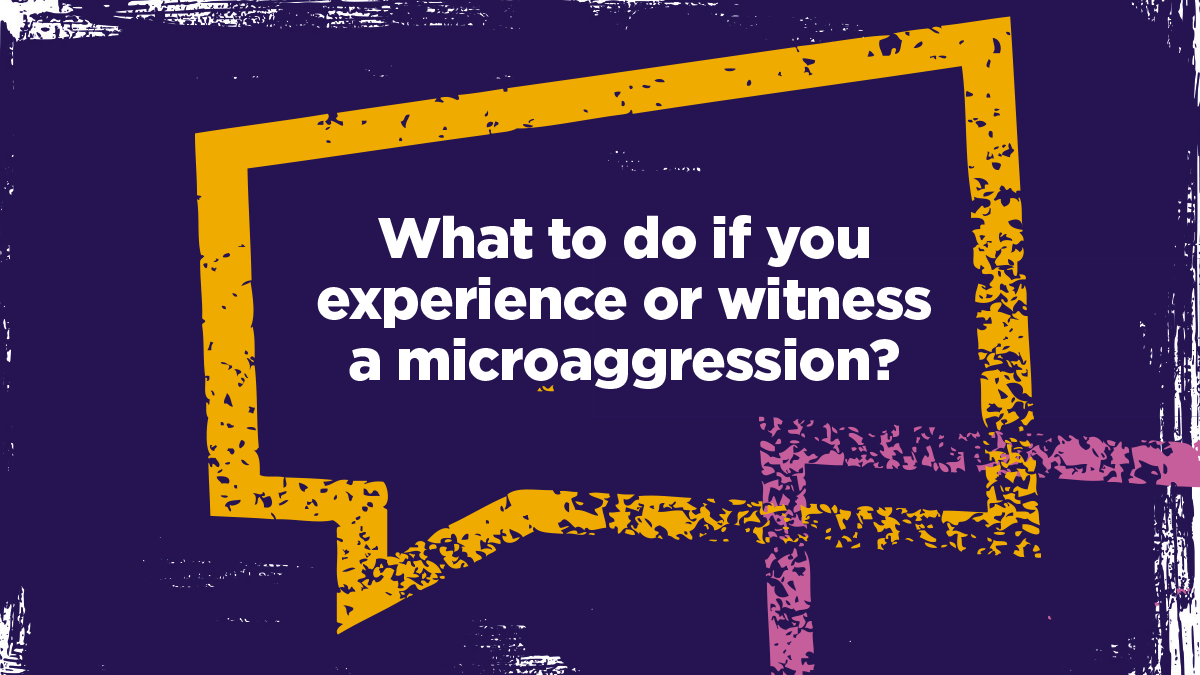Our insight showed physiotherapy professionals were reluctant to report microaggressions directed at them or ones they witnessed. Others said they were unsure what action they should take if a microaggression was reported to them.

[The microaggression] was discussed in a meeting - the perpetrator denied it, never apologised, and it was forgotten about.
If you feel that you've experienced or witnessed a microaggression at work or in an educational setting then there are several steps you can take.
Speak to your CSP steward or a trusted member of staff
Your CSP steward, personal tutor or other trusted member of staff should be your first point of contact when discussing workplace issues including microaggressions.
If you are the person experiencing microaggressions, they can offer guidance to help you to address this and put mechanisms in place to support you at work, on placement or on campus.
Microaggressions can wrongly be seen as humour and banter. Attacks that are not quite so openly expressed or clear are passed off as 'funny jokes'.
If you are not experiencing microaggressions yourself but recognise that there is a culture of this type of behaviour, you can speak to your steward, freedom to speak up guardian, programme staff, student wellbeing service or students’ union representative about how to address this.
You can ask if there are any relevant codes of conduct or behaviour policies such as an equality policy in place that should already address this and can suggest new policies, amendments and education.
Where there is an equality policy in place, you should check what the policy says in relation to discrimination. A policy should clearly state on which grounds it is committed to tackling discrimination. Where improvements are needed these can be negotiated by a workplace steward. In the NHS, there are a variety of staff networks that your steward can raise these types of issues through.
If your workplace does not have a CSP steward, your first point of contact should be your line manager. It is their responsibility to implement policies and procedures that protect you from discrimination in the workplace.
If you have tried this route and are not getting the support you need, contact the CSP, who will be able to provide employment advice and support.
Further information
Say something
Call out microaggressions. Tell the person why their behaviour was not acceptable. This takes a lot of courage and may be especially daunting if the perpetrator is in a position of power, such as a lecturer or manager.
You may also be worried about addressing patients’ behaviour. Consider how you can create a safe space to do this and ask for support if you need it. For instance, is the conversation best in a group setting or one to one?
It’s very difficult to call out microaggressions because people get defensive and they react. Sometimes you think it’s not worth the effort as they’ll just say, “I’m not being ableist!'.
It can be difficult to speak up on behalf of yourself or someone else. The best opportunities for change can come when someone is open to receiving feedback about the impact of their actions.
It is important to be firm and hold the person accountable, but the conversation may be more successful if approached with compassion and respect.
If the situation doesn’t improve, you should speak to your CSP steward and line manager, or your designated placement contact or personal tutor.
Check if your university or workplace has a report and support system or specific complaints procedure you should adhere to.
Useful resources
- BBC: 'I’m not racist – I’ve watched Django three times on Blu-Ray!' ? w/@Munya Chawawa
- Maya Hu-Chan: Calling out vs calling in: how to talk about inclusion
- Why microaggressions are like mosquito bites
Know your rights
Your workplace or place of education should have policies and protocols to protect staff, students and patients from discrimination. Under the Health and Safety at Work Act, employers should provide systems of work and a working environment which are, as far as is reasonably practicable, safe and without risk to health.
I actually wouldn’t know what to do other than make sure the person [experiencing the micraggression] feels supported.
Where a party is experiencing discrimination, the manager or other senior member of staff should follow the relevant policies to address this. If these policies are not implemented properly, you must speak to your workplace steward who can work with your manager, HR and relevant staff networks.
If you are a student you may want to speak to your personal tutor, practice educator or other trusted member of staff. As a CSP member you can also get support from CSP networks.
Useful resources
- NHS staff terms and conditions handbook, Part 5: equal opportunities
- CSP equality and diversity toolkit – Sections 1,2 and 7
- Equality Act 2010 Statutory Code of Practice: employment
- CSP resource pack on managing performance and capability
- Health and Safety at Work etc. Act 1974
If you're a manager then see our page on the responsibilities you have
If your workplace does not have a CSP steward, why not become one? Being a steward is a great way to learn new skills, support your colleagues, develop your career and make a real difference. Find out more<



































